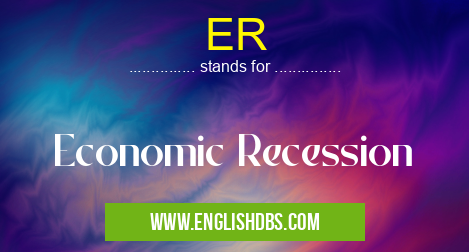What does ER mean in
ER stands for Economic Recession, a period of decline in economic activity, characterized by high unemployment, low consumer spending, and slow economic growth. In governmental context, ER often triggers government intervention through monetary and fiscal policies to stimulate economic recovery.

ER meaning in in Governmental
ER mostly used in an acronym in Category Governmental that means Economic Recession
Shorthand: ER,
Full Form: Economic Recession
For more information of "Economic Recession", see the section below.
» Governmental »
Economic Recession
An economic recession is typically defined as a decline in Gross Domestic Product (GDP) for two or more consecutive quarters. This decline leads to reduced production, lower employment, and decreased consumer spending. Economic recessions are caused by various factors, including:
- Demand Shock: A sudden decline in consumer spending or investment can lead to a recession.
- Supply Shock: Natural disasters, labor strikes, or oil price shocks can disrupt production and cause a recession.
- Financial Crisis: A collapse in financial markets can freeze credit and investment, leading to a recession.
Impacts of Economic Recession
Economic recessions have severe impacts on individuals and businesses:
- High Unemployment: Recessions lead to job losses, increasing unemployment rates.
- Reduced Income: With high unemployment, households experience reduced income and decreased spending.
- Business Closures: Many businesses struggle during a recession, leading to closures and further job losses.
- Government Deficit: Declining economic activity reduces tax revenue and increases government spending, resulting in fiscal deficits.
Government Response to Economic Recession
Governments typically respond to economic recessions with the following measures:
- Monetary Policy: Central banks lower interest rates to stimulate lending and investment.
- Fiscal Policy: Governments increase spending or cut taxes to boost aggregate demand.
- Structural Reforms: Governments may implement reforms to improve productivity, reduce regulation, and increase competitiveness.
Essential Questions and Answers on Economic Recession in "GOVERNMENTAL»ECONOMY"
What is an economic recession?
An economic recession is a significant decline in economic activity, typically characterized by a fall in GDP, high unemployment, and a slowdown in business activity. It is often accompanied by a rise in inflation and a decrease in consumer spending.
What causes an economic recession?
Recessions can be caused by a variety of factors, including:
- External shocks (e.g., a global pandemic or a major financial crisis)
- Internal factors (e.g., a decrease in consumer spending or a reduction in investment)
- Structural changes in the economy (e.g., a shift from manufacturing to services)
What are the consequences of an economic recession?
Recessions can have severe consequences, including:
- Job losses and unemployment
- Reduced economic growth
- Increased poverty and inequality
- Lower tax revenues
- Reduced government spending
How can a recession be prevented or mitigated?
Governments and central banks can use various measures to try to prevent or mitigate the effects of a recession, such as:
- Fiscal policy (e.g., increasing government spending or reducing taxes)
- Monetary policy (e.g., lowering interest rates)
- Structural reforms (e.g., improving education and healthcare)
What are the typical phases of an economic recession?
Recessions typically follow a series of phases:
- Expansion: The economy grows, and unemployment falls.
- Peak: The economy reaches its highest point of growth.
- Contraction: The economy begins to decline, and unemployment rises.
- Trough: The economy reaches its lowest point of contraction.
- Recovery: The economy begins to grow again, and unemployment falls.
Final Words: Economic recessions are periods of economic decline with significant impacts on individuals and businesses. Governments play a crucial role in mitigating the effects of recessions through monetary and fiscal policies. Understanding the causes, impacts, and government responses to economic recessions is essential for policymakers, businesses, and individuals to prepare for and manage these periods of economic downturn.
ER also stands for: |
|
| All stands for ER |
